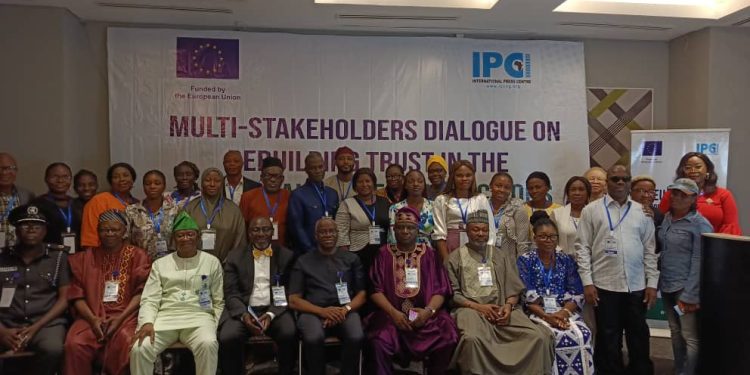Election stakeholders have said the task of rebuilding trust in Nigeria’s electoral process and elections cannot be limited to the Independent National Electoral Commission (INEC), but must include electorates, politicians, political parties, and security agencies.
The election stakeholders reached this consensus during a multi-stakeholder dialogue on Rebuilding Trust in the Electoral Process, Institutions and Elections, organized by the International Press Centre under the European Union Support to Democratic Governance in Nigeria (EU-SDGN) Program.
The dialogue, which had in attendance participants from different agencies, electoral management bodies, academia, civil society, and media, featured high-level conversations on the role of individuals and institutions on how to rebuild trust in Nigeria’s electoral process.
Delivering the lead presentation titled ‘Deepening Commitments for Multi-Stakeholder Collaboration in Rebuilding Trust in the Electoral Process and Institutions’, Prof Isaac Olawale Albert from the Institute for Peace and Strategic Studies at the University of Ibadan explained that without trust in the electoral process, democracy is a façade.
Prof Albert, who noted that there is no alternative to democracy with elections being important in the process, stressed the need for relevant stakeholders to remain committed to ensuring that democracy is sustained.
The Professor of African History, Peace and Conflict Studies highlighted that for trust to be restored, “the leaders must be able to demonstrate competence, act with integrity, care about others and honour their commitments.”
While he acknowledged that everyone in the country operates in a volatile, uncertain, complex and ambiguous society, Prof Albert recommended that “we need to jointly acknowledge that there is a problem, develop appropriate conditions for solving the problem (group dynamics, perception and attitudes), generate alternative solutions, identify, evaluate and select viable solutions.”
Prof. Okechukwu Ibeanu, Election Administration Expert, Development Alternatives Incorporated (DAI), explained that without trust, there is not much that can be done in the electoral process.
Prof Ibeanu identified trust as a fundamental factor in the electoral process, adding that, “for trust to exist, there are three important factors; normative framework – a system of rules; secondly, to implement the rules, the people who will implement it must have the well withal to do it, and the third factor is when people decide to do the wrong thing, there must be a robust system of redress to hold them accountable, and there should be a system of rewarding those who have done the right thing.
“Similarly, in rebuilding trust in the elections, election stakeholders will do the right thing and desist from doing the wrong thing, this is not just about EMBs, it is about political parties, media, and voters themselves, and whenever the wrong thing is done, they should be sanctioned accordingly,” he added.
Earlier in his welcome remarks, Mr Lanre Arogundade, the Executive Director of IPC said “it cannot be denied that some contentious issues arising from the 2023 elections have created mistrust among Nigerians. It’s in the public domain that the elections met with some unexpected challenges which ordinarily shouldn’t overshadow its significant milestones including the meticulous preparation and the use of technology for voting via BVAS which remain highly commendable.”
While noting that some of the contentious issues in the elections have led to a lack of trust in the electoral process, Mr Arogundade posited that “the task of building trust in the electoral process is a collective responsibility that should be undertaken by all.”
The co-host, Dr Akin Akingbulu, the Executive Director of the Centre for Media and Society (CEMESO), noted that “there are gaps in the process leading into the elections, gaps in the performance of institutions, gaps in the conduct of elections on election day. And if these gaps are not addressed, it would be difficult to rebuild the trust of citizens in the electoral process.”
Dr Akingbulu said it is expected that “stakeholder institutions can continue to make contributions to ensure that our elections are of top and increasing quality, that the process is free, fair, credible and inclusive and that outcomes meet citizens expectations all the time.”
On her part, Florence Austin from the Centre for Citizens with Disabilities (CCD) called for a more inclusive and equitable electoral process, noting that “an election is inclusive when it takes cognizance of all aspects of the society, especially persons with disabilities.”
Prof Ayobami Salami, the Lagos State Residential Electoral Commissioner, appreciated the organizers and said “INEC as an institution values this engagement, we are open to more suggestions and recommendations, and we will continue to review inputs that are targeted at making the electoral process a better one.”
Also in attendance at the dialogue were Hon Yusuf Dantelle, Inter-Party Advisory Council (IPAC), ACP Oyewole Emmanuel representing the Inspector General of Police, Dr Mustapha Adedeji Tukur, Lagos Director of the National Orientation Agency, representatives of religious bodies, CSO groups, and media.

